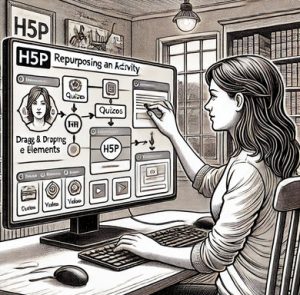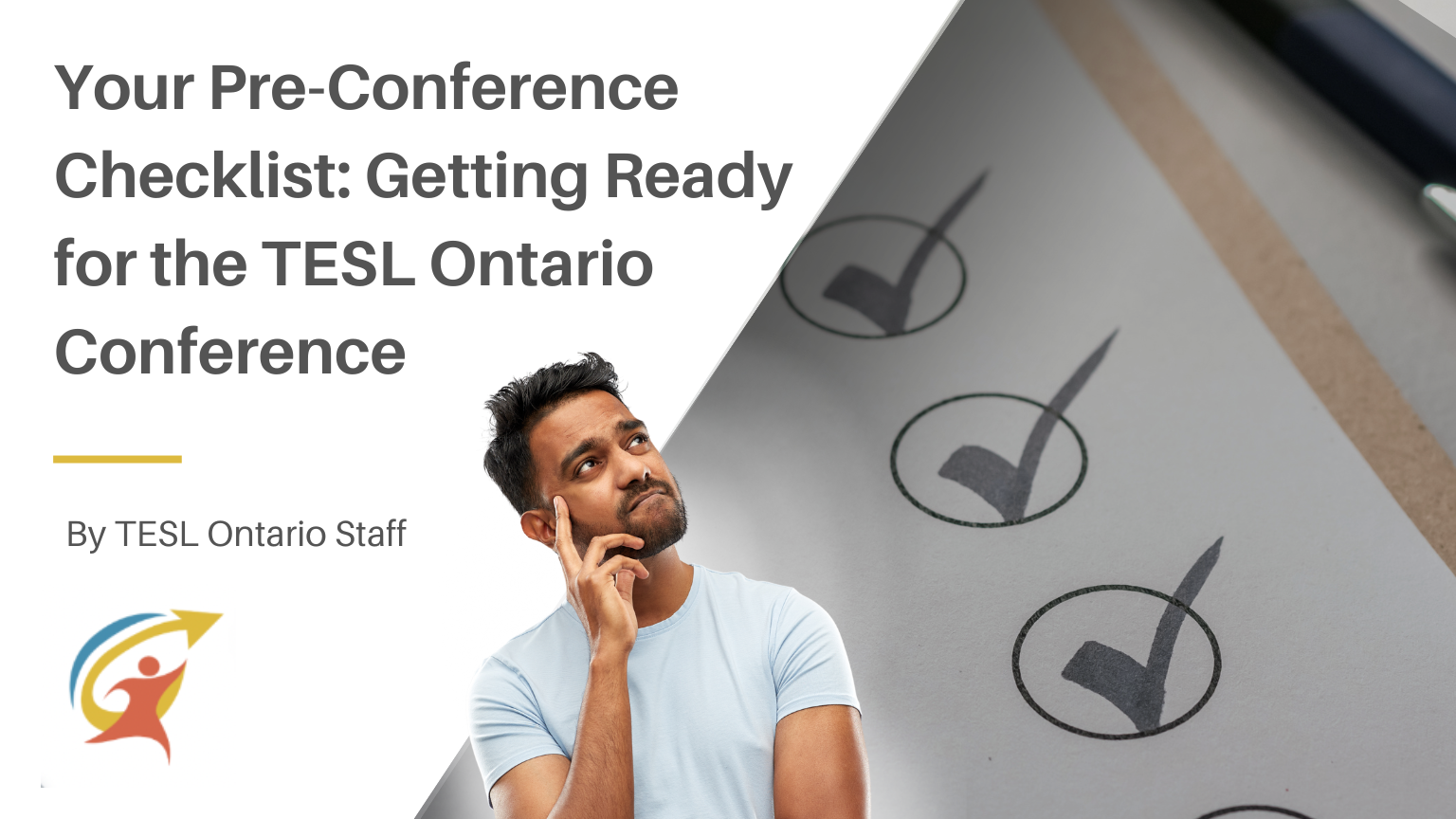My experience ranges from teaching students in a private school from grades 1 to 5 to tutoring adults at the public library. My current experience, and the most rewarding one, is tutoring English at the Hamilton Public Library. We cannot disregard the power of one-on-one instruction. That one or two hours a week of attention can change a person’s outlook. Not only are we teaching them English, but we are also trying to boost their self-confidence in a world where they need to navigate, learn, and jump back up after rejection or criticism. Continue reading
That one or two hours a week of attention can change a person’s outlook. Not only are we teaching them English, but we are also trying to boost their self-confidence in a world where they need to navigate, learn, and jump back up after rejection or criticism. Continue reading
Category Archives: Academic
AI? No, Thank You. I’d Rather Stick with My Teacher.
Teaching and learning in the age of AI is fascinating for both teachers and students. Both can largely benefit from this phenomenon, making their journeys much more efficient.  Of course, we all know when AI can backfire, and to be frank, as an ESL teacher, I think it backfires when irresponsibility creeps in on both ends. This blog post, however, isn’t focused on this issue. Instead, I’m going to focus on those who are responsible and committed to learning. I’d like to share my opinion and my experience in class when students eventually told me, “AI? No, thank you. I’d rather stick with you, human teacher.”
Of course, we all know when AI can backfire, and to be frank, as an ESL teacher, I think it backfires when irresponsibility creeps in on both ends. This blog post, however, isn’t focused on this issue. Instead, I’m going to focus on those who are responsible and committed to learning. I’d like to share my opinion and my experience in class when students eventually told me, “AI? No, thank you. I’d rather stick with you, human teacher.”
Artificial Intelligence: Are Educators Secure?
 Artificial intelligence is a quickly growing technological development that is rapidly transforming various sectors of society. Also referred to as “machine intelligence,” artificial intelligence (AI) is demonstrated by non-humanoid or humanoid robots that behave similarly to humans, and this technology can be applied to businesses in order to enhance and improve operational efficiency (Prentice et al., 2019).
Artificial intelligence is a quickly growing technological development that is rapidly transforming various sectors of society. Also referred to as “machine intelligence,” artificial intelligence (AI) is demonstrated by non-humanoid or humanoid robots that behave similarly to humans, and this technology can be applied to businesses in order to enhance and improve operational efficiency (Prentice et al., 2019).
How teachers can best help adult ESL students with basic English proficiency who are struggling with digital literacy?
Learning in the age of advanced technology and AI is a great opportunity for both learners and educators.
Much of the teaching and learning is now being conducted on virtual platforms, which undoubtedly requires users to know how to manage computers, the Internet and technology well. In other words, developing digital literacy now holds a prominent position in education. In this context, as ESL teachers working with various proficiency levels, our job with elementary learners who lack enough digital literacy might require more effort to handle both fronts successfully. We should be mindful of the fact that handling both language learning and digital literacy is quite challenging for learners, and the reasons why some adults are struggling with digital literacy is also important if we want to help them overcome this challenge. So, in this blog post, I’ll point out why some learners at the basic level are struggling with technology in their learning and suggest how teachers can help them overcome these problems.
In other words, developing digital literacy now holds a prominent position in education. In this context, as ESL teachers working with various proficiency levels, our job with elementary learners who lack enough digital literacy might require more effort to handle both fronts successfully. We should be mindful of the fact that handling both language learning and digital literacy is quite challenging for learners, and the reasons why some adults are struggling with digital literacy is also important if we want to help them overcome this challenge. So, in this blog post, I’ll point out why some learners at the basic level are struggling with technology in their learning and suggest how teachers can help them overcome these problems.
Your Pre-Conference Checklist: Getting Ready for the TESL Ontario Annual Conference
With TESL Ontario’s annual conference just around the corner, prepare ahead of time to make the most of this enriching event. Whether this is your first time attending or you’re a seasoned conference-goer, this handy checklist will help ensure you are ready to engage, learn, and connect.
Teacher Reflective Practice to Foster Student Engagement
I’ve witnessed many programs permanently transition to facilitating education through an online platform ever since the onset of the COVID-19 pandemic lockdowns. Educational programs have either completely transitioned to online learning or have exploded with additional online offerings. However, have teacher education programs reformed their curricula to offer teaching strategies and theories related to the increased demand for online learning? In other words, are teachers being taught how to teach online? Perhaps not.
Educational programs have either completely transitioned to online learning or have exploded with additional online offerings. However, have teacher education programs reformed their curricula to offer teaching strategies and theories related to the increased demand for online learning? In other words, are teachers being taught how to teach online? Perhaps not.
Customizing H5Ps

There are thousands of H5P learning objects available online through repositories, open education resources and shared courses. Many of them have a Reuse button. By clicking on this button, educators can download an H5P and use it as it is or they can customize the H5P.
H5P, HTML5 Package, is an online set of tools that facilitates the creation and sharing of interactive, multimedia content. These are normally used for educational purposes. They enhance learner engagement with interactivity, immediate feedback and mixed media. H5P offers a variety of content types like quizzes, interactive videos, presentations, and games, which can be easily integrated into online learning platforms such as Canvas, Moodle or Brightspace. One of the best attributes of H5P is the ability to customize existing H5Ps. This can save time, energy and development costs. It also saves training time for teacher-developers.
Continue reading
Poodll on Moodle

I was fortunate enough to have moderated a few Avenue webinars on Poodll technologies in June. The webinar speaker was Justin Hunt, the founder and CEO of Poodll. I have since been developing learning experiences for the CanAvenue.ca project using Poodll technologies and would like to share some of the basics with the TESL Ontario community through this blog post and a TESL Ontario webinar.
Helping Unsuccessful Listeners
 One of the main challenges that ESL students face both in language learning in general and in listening skills specifically, is how to improve! Often, not surprisingly, one of the teachers’ frustrating questions is how to help their students overcome their difficulties. In fact, they should both know that if they place their focus on the listening process, they can improve listening skills, and achieve successful comprehension. In this blog post, I’d like to highlight the problems that students deal with in this process, and how we can better assist them as teachers. Continue reading
One of the main challenges that ESL students face both in language learning in general and in listening skills specifically, is how to improve! Often, not surprisingly, one of the teachers’ frustrating questions is how to help their students overcome their difficulties. In fact, they should both know that if they place their focus on the listening process, they can improve listening skills, and achieve successful comprehension. In this blog post, I’d like to highlight the problems that students deal with in this process, and how we can better assist them as teachers. Continue reading
Making Meaning in Online Environments
Let’s face it, teaching in an online learning environment can be difficult when it comes to engaging and motivating learners. This non-traditional learning environment poses an additional challenge to ensure learners are constructing meaning from the content and deepening their learning and understanding.
motivating learners. This non-traditional learning environment poses an additional challenge to ensure learners are constructing meaning from the content and deepening their learning and understanding.
Educators often struggle to help learners make meaningful connections to the content while deepening their understanding within an online learning environment. For this reason, I want to emphasize the benefits of discussion boards in online learning.
Discussion boards can be defined as virtual platforms where learners can interact with their instructor and peers by posting and responding to discussion posts. This type of interaction and knowledge building foster a sense of community among students while promoting active learning within an online learning environment. Continue reading

